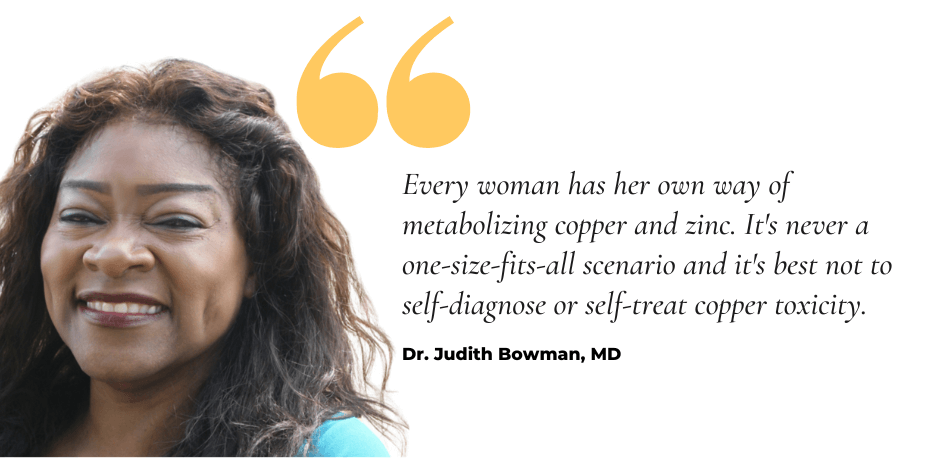High anxiety, depression, brain fog, chronic fatigue, insomnia, and PMS.
If you’ve struggled with any of these health challenges, you’re not alone. It’s estimated that over 50% of females are estrogen dominant and one in eight will develop breast cancer.
These are staggering statistics but there is another insidious invader of our bodies. It’s called copper toxicity, a condition that wreaks havoc on both the mind and body. And, unfortunately, most women and doctors are completely unaware of it.
On today’s special women’s health episode, my personal physician, Dr. Judith Bowman and I talk about the ins and outs of this volatile metal.
Dr. Bowman specializes in biochemical imbalances and co-founded Mensah Medical in 2008 with her colleague, Albert Mensah, MD. Dr. Bowman combines traditional medicine with the biochemical approach to treat the symptoms of behavioral and cognitive disorders, autism spectrum disorder, depression (including postpartum depression), anxiety, eating disorders, bipolar disorder, schizophrenia, and other biochemical imbalances.
Listen to the full episode to hear:
- Why women are impacted by copper toxicity
- The intricacies of copper toxicity and how this condition affects the brain and the body
- The connection between copper, estrogen, and breast cancer
- Copper toxicity and menstrual disorders: endometriosis, PCOS, PMS, PMDD
- Copper toxicity and anxiety, depression (especially postpartum), and psychosis
- Why hair tissue mineral analysis is not an accurate testing method
- The myth of copper deficiency and at the same time, excess







2 Responses
Excellent and informative interview. Thank you both for your work!
You mentioned that high % free copper and high serum copper are different phenomenons. Is high % free copper due to low ceruloplasmin treated differently than elevated serum copper? In other words, would treatment focus on elevating ceruloplasmin or rather lowering serum copper? What would be the reasons for one to have low ceruloplasmin levels(mineral metabolism disorder)?
Is it possible to have copper toxicity even if your copper levels are below the reference range? I have “low” copper but a lot of symptoms of copper toxicity according to this list.